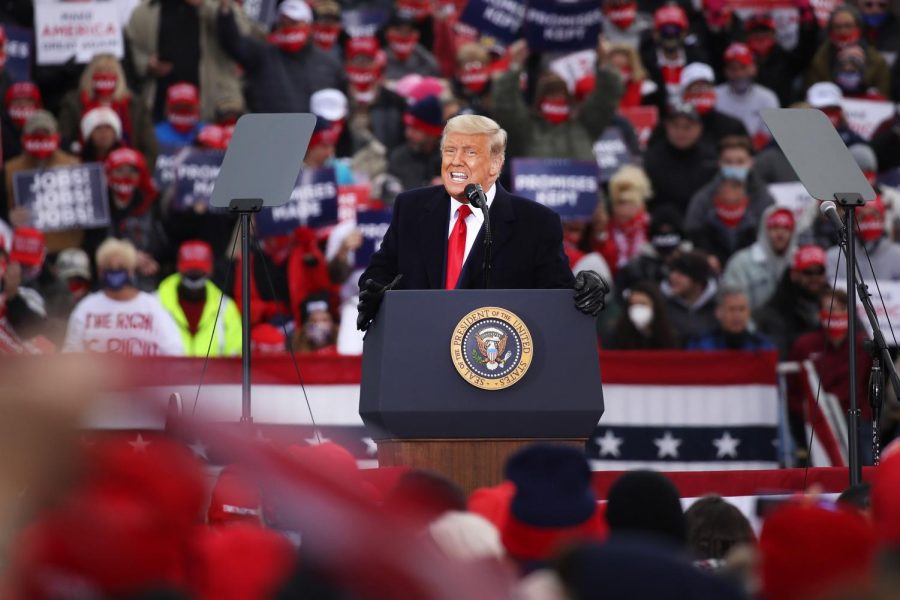UI professor explains possibility of contested election
Photo Courtesy of Spencer Platt/Getty Images/TNS
President Donald Trump speaks at a campaign rally in Reading, Pennsylvania, on one of four stops in the Keystone State on Saturday.
November 2, 2020
The increase of mail-in and absentee ballots because of the global pandemic and different institutional distrust in laws increases the possibility of legal action over ballot counting procedures in swing states, which could result in a contested election.
Richard H. Piles, a professor at New York University School of Law, explained the major concerns over the contestation and delay of election results along with Vikram David Amar, a professor at the University during a Zoom lecture for Law.
There are more likely to be an increased amount of problems regarding absentee voting and the spread of information this year, Piles explained. People who requested absentee ballots but decide to show up in person can slow election results down and lead to election officials having to make sure that ballot isn’t already cast.
Institutional issues also risk further delay or delegitimization of the election process, according to Piles. He explained how we have “candidates who are prepared to delegitimate the election process without question.”
“If we get into a really close election, which almost by definition will become a contested election, I don’t have confidence we have institutional legitimacy with the various institutions that would have to be involved to help resolve this process,” Piles said.
Get The Daily Illini in your inbox!
This belief that correlates with similar beliefs of a “rigged election” from the losing side leads to less acceptance over results and more conflict. Piles noted specific concerns with Pennsylvania which he says has a “toxic combination of being an extremely critical state with the worst election policies in the country.”
Pennsylvania is a swing state (a similar amount of support for each candidate is present which makes them deciding factors in close elections). With the influx of mail-in ballots this year, it is unlikely that swing states will show a clear winner as quickly as last year, according to the lecture.
A Supreme Court decision recently allowed longer deadlines for absentee ballots to be counted in Pennsylvania and North Carolina up to three days after election day as long as the ballot is postmarked by Election Day. Pennsylvania is also one of the seven states in which mail-in ballots cannot begin being processed until Election Day.
These policies lead to even further delay of election results in Pennsylvania. Piles also explained, however, that with the more early votes that come in, the less of an effect the three-day window of processing and counting absentee ballots will have on results.
“No matter what the outcome, if it comes down to litigation and a fight in Pennsylvania after Tuesday, there really is no happy outcome to that even though there will have to be a resolution,” Akram said.
Piles also noted how the outcome has to be resolved more quickly than other elections.
“If we want to imagine a nightmare scenario, the presidential election is under a totally different timetable than any other election; it has to get resolved more quickly than any other election has to get resolved,” Piles said.
The electoral college and the statute that regulates it says the electors have to vote by Dec. 18, six weeks after the election. Even under normal circumstances, any disputed issues over the election risks prolonging the results for five or six weeks.
“If we’re gonna contest a close election and we have lots of absentee ballots still to process and count in critical states, like Pennsylvania or Wisconsin or Michigan which all do this process more slowly than states like Florida, you can imagine the process being dragged out maybe even intentionally,” Piles said.
If it is decided that there won’t be a “clear final solution of who won the vote” in time (or the election has failed) in a certain state, legislatures can step in and appoint the electors in whatever manner the legislature decides. Electors are usually determined by popular vote, but in cases where the election has “failed,” the legislature can decide.
What is likely to happen in this scenario, according to Piles, is that governors would probably quickly certify the candidate who is currently winning the popular vote in that state as the winner. This would lead to two different slates of electors — most likely one for Donald Trump and one for Joe Biden — being submitted to Congress under a joint session.
Although this process is very complicated and unclear, Akram said it is “ultimately the governor who gets to make a call and represent which slate actually speaks for the state.” Congress then has to decide which votes to count from a state if two or more slates of electors are submitted.
“We don’t want to get to any of those places,” said Piles. “If we do, we’ll be in for a very very difficult situation.”







